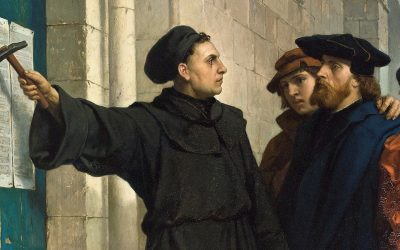The Protestant Reformation, a pivotal movement in the 16th century, fundamentally transformed Europe’s religious, political, and cultural landscape. Initiated by figures like Martin Luther, John Calvin, and Huldrych Zwingli, this period marked a profound departure from the medieval Catholic Church’s doctrines and practices, leading to the establishment of various Protestant denominations.
Origins and causes
The roots of the Reformation can be traced back to a myriad of social, political, and religious factors that had been fermenting for centuries. By the early 16th century, the Catholic Church wielded immense power and wealth but was also plagued by corruption and moral decay. The sale of indulgences, which promised remission of sins for money, epitomised the excesses and abuses of the Church. Additionally, the Renaissance had ushered in an era of humanism, encouraging critical thinking and questioning of traditional authority, including the Church.
Martin Luther and the Ninety-Five Theses

The catalyst for the Reformation was Martin Luther, a German monk and theologian. On 31 October 1517, Luther nailed his Ninety-Five Theses to the door of the Wittenberg Castle Church. This document criticised the Church’s practices, particularly the sale of indulgences, and called for a return to what Luther perceived as the true teachings of the Bible. Luther’s ideas rapidly spread across Europe, thanks to the advent of the printing press, which played a crucial role in disseminating Reformation ideas.
Luther’s teachings emphasised salvation by faith alone, the authority of Scripture over Church traditions, and the priesthood of all believers. His refusal to recant his views at the Diet of Worms in 1521 resulted in his excommunication, but by then, his ideas had already gained substantial support.
The Diet of Worms
The Diet of Worms, held in 1521, was a critical assembly of the Holy Roman Empire convened in the city of Worms, Germany. Luther was summoned to appear before the assembly to defend his teachings. On 17 April 1521, he was shown copies of his books and asked to recant their contents. Given a day to consider, Luther returned on 18 April and famously declared that he could not recant unless convinced by Scripture or clear reason, concluding with, “Here I stand, I can do no other. God help me. Amen.”
Following his refusal, Emperor Charles V issued the Edict of Worms, declaring Luther an outlaw and heretic, banning his writings, and commanding his arrest. Despite this, Luther was protected by Frederick the Wise, Elector of Saxony, and continued his work in hiding.
Expansion and divergence
The Reformation quickly expanded beyond Germany. In Switzerland, Huldrych Zwingli and later John Calvin emerged as leading reformers. Zwingli’s ideas closely paralleled Luther’s but also included significant differences, particularly regarding the Eucharist. Calvin, based in Geneva, developed a systematic theology known as Calvinism, which emphasised predestination and the absolute sovereignty of God.
In England, the Reformation took a different path. King Henry VIII, initially a defender of Catholic orthodoxy, broke away from the Roman Church when the Pope refused to annul his marriage to Catherine of Aragon. This led to the establishment of the Church of England, with the king as its supreme head. Although initially more politically than theologically motivated, the English Reformation eventually adopted many Protestant tenets.
Impact and legacy
The Protestant Reformation had far-reaching consequences. It fractured the unity of the Western Church, leading to religious wars and conflicts such as the Thirty Years’ War, which devastated much of Europe. The Reformation also stimulated significant political and social changes. It encouraged the rise of nation-states and diminished the power of the papacy and the Catholic Church’s political influence.
Culturally, the Reformation promoted literacy and education, as Protestants emphasised reading the Bible in the vernacular. This movement laid the groundwork for the Enlightenment by fostering a spirit of inquiry and challenging traditional authorities.
The Catholic Church responded with the Counter-Reformation, initiated by the Council of Trent (1545-1563). This movement addressed many of the abuses criticised by the reformers and led to a revitalisation of the Catholic faith. New religious orders, such as the Jesuits, played a pivotal role in reinvigorating the Church and spreading Catholicism globally.
The Protestant Reformation was a watershed moment in European history. It transformed Christianity and reshaped Europe’s political, social, and cultural fabric. Its legacy is evident in the diverse Christian denominations that exist today and the enduring emphasis on individual faith and the authority of Scripture.






Leave a Reply